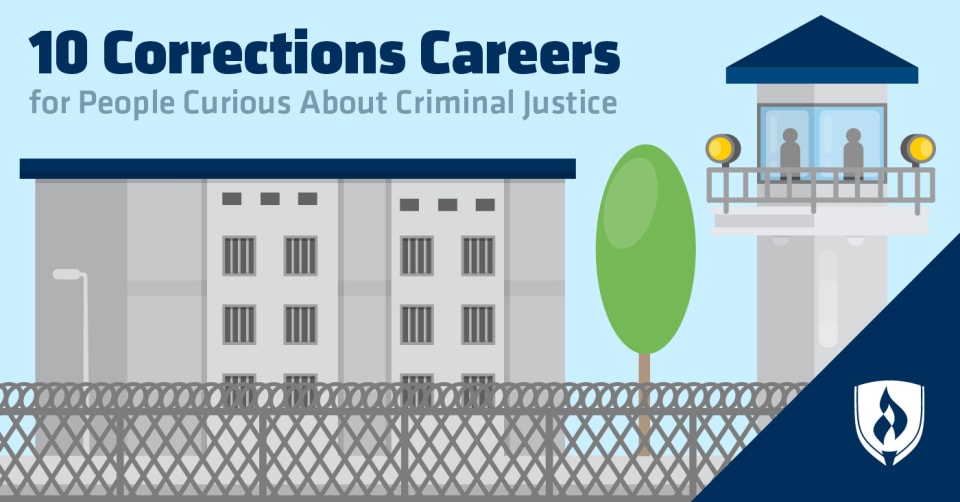
The justice system has always fascinated you. You can’t get enough of true-crime podcasts, Law & Order and documentaries like Making a Murderer. You’ve often wondered whether a career in corrections could be right for you, but you don’t even know where to start.
Corrections careers come in a variety of flavors to suit nearly any personality type and skill set—some roles focus on keeping correctional facilities orderly and safe, while others are dedicated to rehabilitating offenders mentally, spiritually and even physically.
To help you better understand your potential options, we created this list profiling 10 corrections-related careers.
10 Corrections careers to consider
There are a lot of individuals working to keep the correctional system running smoothly. Learn more about a few of these important positions.
1. Correctional officer
Correctional officers work within jails or prisons to oversee inmates and suspects awaiting trial. They perform checks to ensure the security of the facility, watch over inmates and file reports on their behavior and provide secure transportation for inmates traveling to and from the facility. Corrections officers plan an absolutely critical role in keeping corrections staff, as well as inmates, safe as they are on the front lines of asserting control over a facility. This is a role that requires thick skin and an excellent sense of composure during stressful situations.
2. Pretrial services officer
This corrections role focuses specifically on defendants who are charged with crimes but are awaiting trial. These corrections officers dig into a defendant’s background prior to their trial to evaluate if they can safely remain part of society while they await their trial date. Pretrial services officers weigh the safety and flight risks of the defendant, then present their findings to a judge, who sets a bond amount. They are also tasked with keeping tabs on defendants who are released to the public and making sure they appear for their trial date.
3. Bailiff
These law enforcement officers are responsible for keeping the peace in courtrooms. A bailiff’s duties generally include maintaining safety by upholding courtroom rules, delivering documents and other evidence to the judge and escorting jurors, witnesses and prisoners. This position plays an important role in maintaining the neutrality of a criminal trial—for example, they keep an eye on attorneys and witnesses to make sure they don’t influence jurors outside of the courtroom.
4. Probation officer
The people in this corrections career support those who have been placed on probation rather than being sent to prison. Probation officers work closely with their probationers, providing resources to help them rehabilitate, creating a treatment plan and regularly evaluating their progress.
5. Substance abuse counselor
Substance abuse counselors provide support to people who are working to overcome addiction to substances such as drugs or alcohol. In a correctional setting, they evaluate inmates’ mental and physical health, create treatment plans, educate them about addiction and help clients develop the skills they need to change their destructive behavior.
6. Corrections nurse
Prisons and jails house a lot of people who regularly need medical care. Corrections nurses—both registered nurses (RNs) and licensed practical nurses (LPNs)—are tasked with treating a wide array of potential ailments and health issues among correctional facilities occupants. Nurses in this role can expect to treat fight-induced wounds, addiction withdrawal symptoms and also run-of-the-mill ailments.
7. Case manager
In corrections settings, case managers work with inmates and probationers to help facilitate their rehabilitation. In this role, they evaluate and help connect the people they’re working with to helpful government and social service organizations. Much of their work involves helping inmates bridge the gap from life in detention to life on the outside. They’ll connect inmates to halfway homes, drug treatment facilities and employment agencies in order to help them get back on their feet as productive members of society.
8. Chaplain
Prison chaplains are members of the clergy who provide inmates with religious counseling and education. They may practice in any religious denomination and are there as a resource for inmates who want to explore their spirituality.
9. Group counselor
These psychology professionals work with inmates in prison as well as those out on parole or probation to modify their behavior and overcome addiction, behavior disorders or mental illnesses. Group counselors provide support in a group setting as they offer resources and treatment options to their clients.
10. Warden
This senior corrections career is responsible for the management and oversight of an entire correctional facility. This role is similar to other management positions—it’s just the work is done in a corrections setting. Wardens are responsible for managing budgets, onboarding and training new corrections officers, setting policies and generally overseeing the day-to-day operations of a correctional facility.
Is a corrections career in your future?
Did you pick your future career out of the lineup? Working in corrections can be an incredible challenge—every day you’ll spend time in the presence of people who are struggling through some of the hardest days of their lives. But those tough circumstances can make the work that much more fulfilling when positive changes are made.
The satisfaction that comes with helping an inmate to get their life back on track isn’t something you see portrayed often in movies or television—but that’s not the only thing mass media gets wrong about corrections. Check out our article, “What Is Jail Really Like? 5 Ways Hollywood Doesn’t Do It Justice,” to get a more realistic view of how corrections facilities are.
Related Articles:




